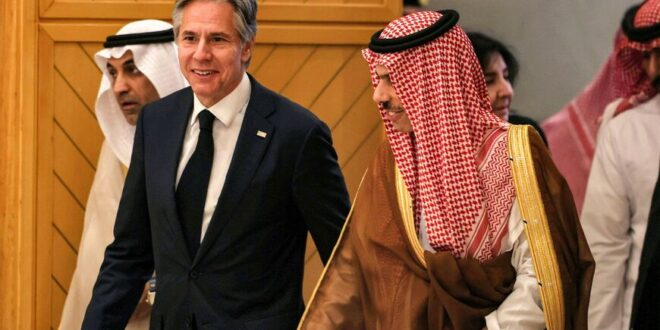At a gathering in Riyadh of the global alliance to defeat IS, US Secretary of State Antony Blinken asked partners to repatriate their detained citizens and announced new funding for stabilization work in Iraq and Syria.
US Secretary of State Antony Blinken urged countries to take responsibility for their citizens suspected of joining the Islamic State and whose detention in northern Syria risks creating a new generation of militants.
Four years after IS lost its last remaining territory in Syria, tens of thousands of suspected fighters and their families are packed into makeshift detention centers and camps in northern Syria under the control of US-backed Kurdish fighters who say they lack the resources to indefinitely hold them.
Of the nearly 10,000 suspected IS fighters in detention, 2,000 are from countries other than Syria and Iraq. Some governments have dragged their feet or flat-out refused to repatriate their nationals stranded in northern Syria, including at the squalid al-Hol camp for women and children in Hasakah province.
“Repatriation is the only durable solution,” Blinken said Thursday at a gathering in Riyadh of the global alliance to defeat IS.
“Failure to repatriate foreign terrorist fighters risks the possibility that they could again take up arms and attempt to restore IS’ so-called caliphate, terrorize communities that we’re working to stabilize and rebuild and potentially threaten our homelands,” he added.
Iraq’s government has stepped up its repatriations from Syria. In the first three months of this year, Iraq took back 1,161 detainees out of some 1,300 who were delivered back to their home countries in that period, according to a recent Pentagon inspector general report.
Blinken and Saudi Foreign Minister Prince Faisal bin Farhan co-hosted the daylong gathering that brought together dozens of senior diplomats from the more than 80-member coalition that was formed as the militant group swept across Syria and Iraq in 2014.
On Thursday, Blinken announced a US contribution of $148 million in new funding for stabilization projects in parts of Iraq and Syria that were liberated from the militant group. He also unveiled sanctions on two senior IS members based in Iraq and the Sahel as part of an effort to cut off the militant group’s ability to raise and move funds.
IS, which at its peak controlled large swaths of Iraq and Syria, continues to pose a threat to the region following the collapse of its so-called caliphate.
Outside of the low-level insurgency IS has waged in Syria and Iraq, the group has expanded its footprint in Africa’s Sahel and West Africa regions. Africa is today home to nearly half of global terrorism deaths, Blinken said.
On Thursday, the anti-IS coalition welcomed the West African nation of Togo as its newest member.
Blinken also highlighted the evolving threat posed by IS-Khorasan, the group’s affiliate in Afghanistan that was behind the suicide airport bombing in Kabul that killed 12 American troops and more than 170 civilians in 2021.
“All of us are determined to see to it that Afghanistan never again becomes a safe haven for terrorists,” he said.
Blinken’s participation in the conference came as part of a three-day visit to Saudi Arabia, during which he met with the country’s de facto leader Crown Prince Mohammed bin Salman and took part in a meeting with the foreign ministers of the Gulf Cooperation Council.
 Eurasia Press & News
Eurasia Press & News




